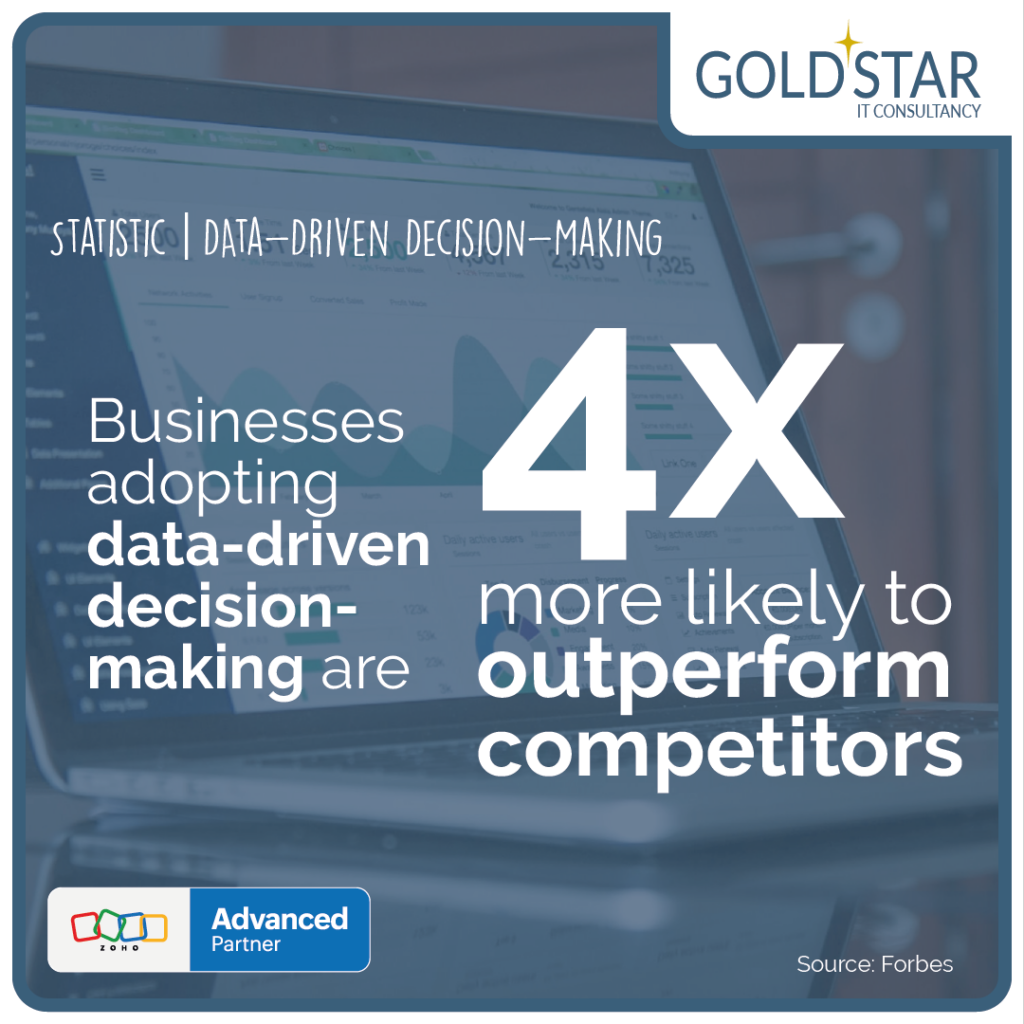How can business data help make better decisions?
Companies using their business data and embracing data-driven decision-making are 4 times more likely to outperform competitors, according to Forbes.
Furthermore, they are 5 times more likely to make faster and more informed choices. Choices that lead to a 30% increase in profitability, according to a study by McKinsey & Company.
In the dynamic landscape of business, the power of informed decision-making cannot be overstated. Let’s dive into the transformative world of data and explore how it’s shaping success. Together let’s discover the stark contrast between companies that leverage data and those that are yet to unlock its potential.

What is Data-Driven Decision-Making?
Data-Driven Decision-Making (DDDM) is a strategic approach that relies on the systematic use of data to inform every business decision. It transforms raw data into actionable insights, providing a roadmap for organisations to navigate challenges, capitalise on opportunities, and make choices grounded in evidence rather than intuition.
In a world inundated with information, DDDM empowers companies to sift through the noise. In doing so they can discern meaningful patterns, and extract valuable insights.
Whether it’s understanding customer behaviour, optimising operations, or predicting market trends, DDDM ensures that decisions are not just educated guesses but calculated moves backed by concrete data.


The difference Data-Driven Decision-Making can make
Consider Company A, a forward-thinking enterprise that embraces data-driven decision-making. On the flip side, there’s Company B, navigating the business terrain without harnessing the power of data.
| Scenario | With Business Analytics | Without Business Analytics |
| Speed and Precision | Armed with data insights, swiftly navigates through decisions with precision, leveraging real-time information. Every decision can be traced to events and any change can be adapted for. | Lacking this advantage, grapples with delayed choices and a lack of clarity. Relying on individuals’ experience and gut instincts, it is impossible to forecast or keep up-to-date with changes. |
| Customer Understanding | Data analysis allows a deep understanding of customers, tailoring products and services to meet their evolving needs, building trust and a good relationship. | Relies on assumptions, often missing the mark in catering to customer preferences giving them a reason to go elsewhere. |
| Operational Efficiency | Optimises operations with data-driven insights, identifying bottlenecks and streamlining processes. Allowing easier planning and resource management | Faces challenges in identifying inefficiencies, leading to resource wastage and increased costs. |
| Adaptability to Trends | Adapts swiftly to trends, capitalising on opportunities before competitors. | Struggles to keep up, reacting rather than proactively shaping its strategy. |
| Profitability | The bottom line reveals the stark contrast – Company A, making decisions based on data, enjoys a 30% increase in profitability | Company B, without this data advantage, lags behind in financial gains. |
Unlocking the Power of Data Analytics
Revisiting the statistic, it’s clear to see where the 30% increase in profitability has come from…
The evidence is clear: companies embracing data-driven decision-making are 4x more likely to outperform competitors. Furthermore they can navigate the complexities of business with speed and precision and enjoy a remarkable 30% increase in profitability.
The benefits unlocked from the power of data analytics extend across every facet of business operations. From strategic decision-making to enhancing customer experiences and driving innovation, embracing data analytics is no longer a choice; it’s a journey toward sustainable growth and unparalleled ongoing business success.
The 5-Minute, 5 question data effectiveness test…
Below are 5 simple questions regarding your data, designed to help give you insight into how you are currently using your business data and if it is actually helping drive your business forward.
Reach out to your team (or try yourself) and ask these questions. You’ll get an instant idea of the effectiveness of your current decision-making model!

- Who? Who needs to access your business data; staff, clients, third-parties, suppliers, etc.
- What? What is the purpose of your collected data? What decisions do you want to make from this data?
- Where? Where does it have to come from. Where does it have to go to?
- When? How often does it need to be accessed? Does it need to be refreshed regularly?
- How? Is it presented in an easy to understand? Will it be viewed via laptop, mobile, in the office or remote?
Your answers can provide valuable insights into your company’s effectiveness in leveraging data to drive decisions. If there’s room for improvement, it might be time to explore how embracing data can be a game-changer for your business success.
Summing up the reasons for Data-Driven Decision-Making
Embracing Data-Driven Decision-Making (DDDM) isn’t just a strategic choice; it’s a pivotal shift toward success in the modern business landscape. From faster and more precise choices to heightened customer understanding, streamlined operations, and a substantial increase in profitability, the benefits of DDDM are multifaceted. It’s not merely about harnessing data; it’s about unlocking a transformative approach that propels businesses toward informed, efficient, and innovative decision-making, shaping a future defined by sustained growth and excellence.
Goldstar are experts in data and how it’s power can be unlocked. Why not call us for a chat about how you can get more for your business and reap the rewards of DDDM that will help you reach your business goals.
